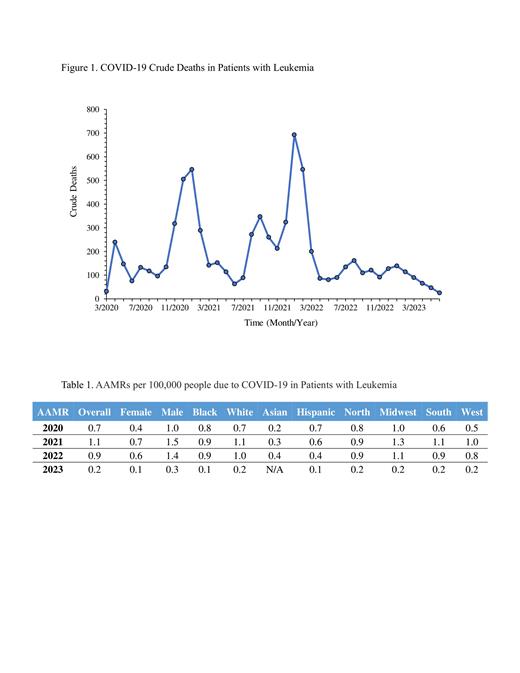Introduction:
Leukemia patients have abnormal immune function due to both the innate characteristics of their disease and the treatments, which are almost invariably immunosuppressive in nature. Treatment modalities may lead to both temporary and long term immunosuppression. For these reasons, the coronavirus disease 2019 (COVID-19) pandemic has posed challenges to the management of patients with leukemia.With the approval of several types of COVID-19 vaccines, the first of which became available in December 2020, there has been a significant decrease in morality from COVID-19 among vaccinated adults compared to unvaccinated adults. It is unclear if the same trend applies to adults with leukemia who may have an impaired immune response to vaccination. To further elucidate the efficacy of COVID-19 vaccination in this inherently immunocompromised group of patients, we performed a nationwide analysis of COVID-19 mortality trends in adults over 25 years old with leukemia.
Methods:
Using the CDC Wonder Database, we reviewed death certificates for COVID-19 related mortality trends from March 2020 to June 2023 for all subtypes of leukemia in the United States in adults above 25 years old. We included respective ICD codes: C91 lymphoid leukemia, C92 myeloid leukemia, C93 monocytic leukemia, C94 other leukemias of specified cell types, and C95 leukemia of unspecified cell types. Age-adjusted mortality rates (AAMRs) were calculated per 100,000 people. Data was stratified by reported sex, race/ethnicity, and census region.
Results:
Deaths from COVID-19 in people with leukemia were reported as 1800 in 2020, 2813 in 2021, 2445 in 2022, and 481 as of June 2023 (Figure 1). There were fluctuations of COVID-19 AAMR per 100,000 people with all subtypes of leukemia from 2020 to 2023 (Table 1). The provisional and incomplete data in 2023 showed a sudden decrease of AAMR within all groups. In 2020 the overall AAMR in all groups was 0.7 which increased to 1.1 in 2021, decreased to 0.9 in 2022, and 0.2 as of June 2023. There is a difference in mortality rates between sex with male AAMR being greater than female in all 3 years. For example in 2021 the AAMR for males was 1.4 while for females it was 0.6. Analysis of racial and ethnic groups showed Asians with the lowest AAMR (0.3 AAMR, 2020) compared to Whites (1.5 AAMR, 2020), Blacks (0.9 AAMR, 2020), and Hispanics (0.6 AAMR, 2020). The trends between the census regions were also comparable.
Conclusion:
The data demonstrates variations in AAMRs from each year to the next. These variations can be affected by infection rates, public health measures, healthcare access, and socioeconomic factors. The 2023 data is still provisional and incomplete, however, they do offer a glimpse of the 2023 trends. The multiple subtypes of leukemia have different degrees of immunosuppression, thus not all leukemia patients have the same risk profile. Despite the type of Leukemia, it is widely accepted that these patients are in an immunocompromised state and at a higher risk to develop complications from COVID-19. It is recommended for all patients with leukemia to receive non-live, attenuated viral vaccines. Although considered safe and recommended, there is very limited data regarding efficacy of the COVID-19 vaccine in immunocompromised patients. One study showed patients with CLL about 36% of patients were seronegative after vaccination (Chatzikonstantinou et al., 2021) and seronegativity rates may be even higher in patients with acute leukemias. Certainly the absence of steady downward trend in mortality following the availability of vaccination suggests either that leukemia patients are not complying with vaccination recommendations or that vaccination is often ineffective in the setting of their inherent immunocompromise. Certainly a limitation of this analysis is the lack of data regarding COVID-related mortality in vaccinated versus unvaccinated individuals. Given the lack of improvement in AAMR among leukemic patients following the availability of a COVID 19 vaccination, it seems appropriate that physicians still recommend using additional preventative measures from COVID-19 including social distancing and mask wearing. It is important to continue studying the relationship between serology positivity, immunity, and overall outcomes.
Disclosures
Koprivnikar:Novatis: Consultancy; GSK: Consultancy; Alexion: Consultancy; Apellis: Consultancy.


This feature is available to Subscribers Only
Sign In or Create an Account Close Modal